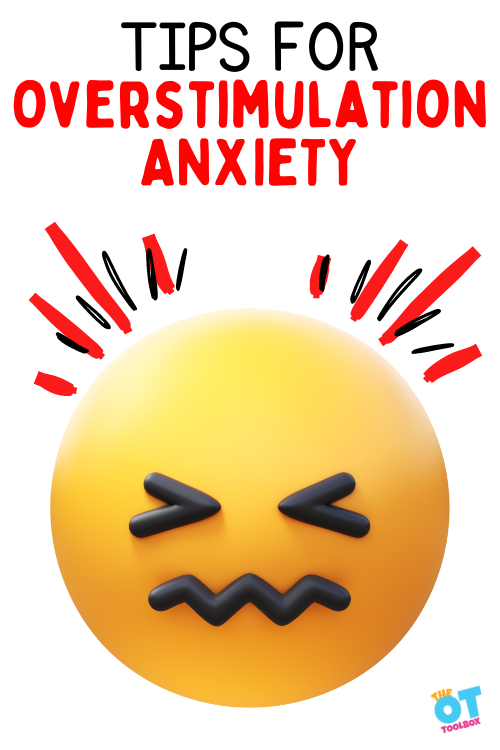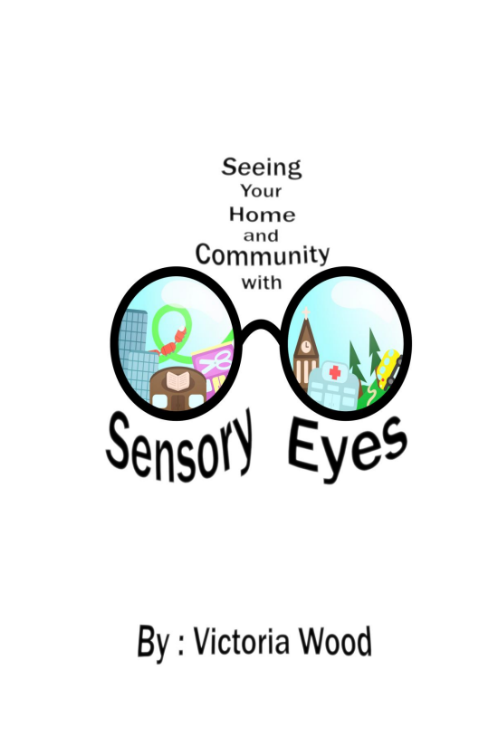Do everyday environments like the grocery store, the mall, or your office leave you feeling anxious and stressed? Does the thought of going to these places that are highly overstimulating with sights, sounds, smell…and people… fill you with dread or a sense of anxiety? If you answered yes to both these questions, you might be suffering from overstimulation anxiety, or some aspect of social emotional skills worries. Our kiddos that we work with with sensory processing needs probably have some aspect of stress associated with overstimulation, and maybe even a sense of doom that they feel when thinking about or heading into stimulating environments.

In this post we will explore what is overstimulation anxiety, what causes it, and therapeutic interventions to help minimize symptoms. Overstimulation anxiety can play a huge role in sensory dysregulation, especially when it comes to self regulation and the ability to use coping tools to support the worries!
Our resource on sensory processing red flags can be a helpful tool as well because it highlights how sensory processing issues, like overstimulation worries, might show up as our OT kids being overwhelmed and overstimulated.
What is overstimulation anxiety?
Sensory overload (another term for overstimulation) is when your five senses — sight, hearing, smell, touch, and taste — take in more information than your brain can process. When your brain is overwhelmed and overstimulated by this input, it enters fight, flight, or freeze mode in response to what feels like a crisis, making you feel unsafe or even panicky. Read more about this in our blog post on the limbic system.
All of this recognizes the ability to check in with emotions and feelings. This is can be a real challenge point for some of our kids! It requires:
When suffering from overstimulation anxiety, also known as sensory overload anxiety, you may experience sensory overload in unfamiliar environments, when you are surrounded by new people, or when expectations are unknown to you. Your senses become heightened and perhaps you are over-responsive to sensory information that would not affect a person without anxiety.
To learn more about situations that can trigger overstimulation anxiety, check out my book, Seeing your Home and Community with Sensory Eyes. It is a comprehensive guide to helping yourself or others navigate different environments. It is broken down into chapters for ease of scanning to find the relevant information. Ultimately, the book answers the question, “why do they do that?”
If you are a child or adult with sensory processing dysfunction, it is probable that being in certain situations will cause you anxiety. The fear of not knowing what sensory experiences may arise is enough to cause you to have a heightened arousal level and be anxious about the “what-if’s” or “maybe’s,” with new experiences. It can even lead to a sensory meltdown.

What is Sensory Overload?
So what is sensory overload? According to WebMd, sensory overload and anxiety are mental health conditions that are deeply related to one another. In some studies, up to 80% of people with sensory processing difficulties experience anxiety. When a person feels anxious or already overwhelmed, they may be more prone to experiencing sensory overload in certain situations. Likewise, experiencing sensory overload can make you feel a sense of anxiety.
Sensory overload and anxiety are mental health conditions! It’s when overwhelming sensory input interferes with our ability to filter out unnecessary and conflicting sensory input. This impacts participation in daily tasks.
So, whether your anxiety causes sensory processing difficulties or your sensory issues cause your anxiety, it is important to address both manifestations.
The way I like to explain it is by describing a busy mall at Christmas time. The lights, crowds, sounds, hustle and bustle are VERY overwhelming. We even wrote a blog post about Christmas mindfulness that goes into this a little more. It’s very overwhelming and that sensory overload is just too much for many of us!
Another way to explain it is by describing therapy burnout that most of us are familiar with. The feeling of overwhelming stress because of productivity, caseloads, extra tasks, emails, phone calls, and everything else that puts us on the verge of burning out. Adding extra sensory input like a jackhammer outside your window will likely cause an overload and you might want to just toss your desk…but you likely won’t. Our kids with sensory needs, however, just might toss that desk.
What causes sensory overload?
According to the folks over at Psych Central, there are many causes of sensory overload, and some underlying conditions that can make you more sensitive to sensory overload.
- Sensory processing sensitivity (SPS)– People with higher levels of SPS, or heightened awareness and reactions to their environment, are also known as highly sensitive people. Being highly sensitive is a personality trait, with about 1 in 5 people fitting into this category. Take the sensitive person quiz to find out if you are an HSP.
- Sensory processing disorder (SPD)– SPD is usually diagnosed in childhood, although adults can also get a diagnosis. It involves either much higher or much lower responses to sensory input than most people experience.
- Autism spectrum disorder. Autistic people are more likely to experience both SPD and anxiety.
- Attention deficit hyperactivity disorder (ADHD)– People with all types of ADHD may also experience higher rates of sensory overload than people without neurodevelopmental conditions.
- Post-traumatic stress disorder (PTSD)– Experiences of trauma that cause PTSD can create more hypervigilance, or awareness of your surroundings. People with PTSD may experience more sensory overload and anxiety in response to sensations that remind them of past trauma.
- Anxiety disorders– Many anxiety disorders, but particularly generalized anxiety disorder, have been linked to sensory processing issues.
What are the symptoms of overstimulation anxiety?
Overstimulation can be triggered by too much input in the environment. You might feel overwhelmed and sensitive to
- bright lights, chaotic movement, or a cluttered environment
- rough, tight, or itchy clothes
- loud noises, voices, or music
- scents including chemicals and perfumes
- foods with strong flavors
- hot or cold temperatures
- too many people in one place (body awareness and proprioceptive sense when there are people in your space)
As a reaction to overstimulation, you might feel:
- overwhelm that makes you want to either shut down or have a meltdown
- irritation or rage
- tension in your face, neck, shoulders, or back
- having either too many thoughts in your mind, or none at all
- exhaustion
- dissociation, or being separated from yourself and your surroundings
Because children have limited problem solving, language, and emotional regulation, their responses are often more exaggerated. They exhibit tantrums, meltdowns, shutdown, or other maladaptive behavioral reactions. We notice the behavior first, however, meltdowns caused by overstimulation usually can be traced back to a trigger.
What can you do to help combat sensory overload anxiety?
Speak to your doctor. Your doctor can help you navigate mental health resources by suggesting specific therapy sessions or medications that could be helpful. Depending on your age, particular triggers, and any associated conditions that you may have, your doctor may recommend some kind of anti-anxiety medication or antidepressant.
Self Care. Keeping yourself well-rested, well-fed, and hydrated are easy ways to empower yourself should you encounter an unexpectedly difficult or overwhelming situation. You can also explore techniques like meditation, mindfulness, and breathing exercises to help yourself de-escalate if you find your sense of anxiety on the rise.
Different types of therapy. Many people find that therapy can be very helpful in navigating anxiety and developing tactics for managing difficult situations.
Identify and avoid triggers. Once you are aware of the particular sensations, situations, or stimuli that make you feel overwhelmed, you can make efforts to stay clear of them. Being upfront with your friends and family can allow them to help you avoid these triggers, too. For example, instead of enjoying a birthday celebration in a busy restaurant, opt for someone’s quiet backyard. Instead of visiting a crowded, loud theater, host a video viewing party at home.
Create a support network – Reaching out to friends and family and sharing with them the struggles you are facing can allow them to offer support. Helping them to understand what you are going through can also make you feel less alone.
Some situations that cannot be avoided can be helped with therapy, medication, and a supportive social network.
Tips for dealing with overstimulation anxiety
There are certain steps you can take on your own to help address your struggle with overstimulation. These are not replacements for therapy but can help you cope with sensory overload in the moment. Here are some tips to address overstimulation:
- Control your environment – Making sure to avoid environments that are full of triggers is a way to help alleviate the frequency of your symptoms. You may find you need to avoid loud concerts, or big parties, or make accommodations to better tolerate them.
- Create a safe space – The world is full of unknowns, and creating a space where you can feel at ease is one way to help give you peace of mind. We call this a personal bubble when helping kids with this safe space. We can also help them to understand personal space. Try to create a space that you can go to feel safe. Somewhere that is free of any triggers that may cause you to feel overstimulated. This is what sparked the Man Cave and She Shed!
- Develop a plan – There are only so many ways to control our environment. Preparing for situations in which you may be exposed to a trigger can help you feel more at ease when going out into the world. Practicing deep breathing exercises, engaging in positive self-talk, keeping noise-canceling headphones (affiliate link) nearby, and developing an exit strategy for situations that might trigger you can make you feel more prepared. I travel with earplugs (affiliate link) and a sweater wherever I go. As a side note, I have tried all types of earplugs and find Mighty Plugs to be superior.
- Stay healthy – Getting regular and high-quality sleep, exercising, and eating a healthy diet are all ways to stay one step ahead of overwhelming situations. If you do these things, the likelihood of feeling prepared for whatever challenges you might face is much higher. You may find you are extra sensitive when you are tired or hungry. A little beach therapy goes a long way!
- Communicate your needs – Whether it is at work or school, communicating your needs is an important part of living with sensory overload episodes. It is possible that accommodations can be made to help you feel more comfortable in the spaces that you need to attend. Open and honest communication can make you feel vulnerable. It is worth the trade off for some peace of mind.
Additional resources
- Adult sensory processing disorder – sensory processing disorder in adults, sensory overload in adults, and how to support sensory sensitive adults.
- Sensory Diet for Adults – adults need to be able to self-regulate, organize their sensory systems, and support their sensory and emotional needs.
- Sensory Meltdown or Tantrum?
- Sensory processing disorder information packet
- Seeing your Home and Community with Sensory Eyes – This manual is a valuable tool for understanding and effectively communicating with those affected by sensory processing disorder. This guide can assist caregivers, individuals, families, therapists, and teachers untangle the web of senses to give correct guidance and assistance. This guide can be read cover to cover for optimal learning, or by selected chapters as needed.
- The Sensory Lifestyle Handbook – The Sensory Lifestyle Handbook is your strategy guide for turning sensory diets and sensory activities into a sensory lifestyle.
- The Sensory Processing Disorder Handbook – This 26 page guide explains SPD in easy-to-understand terms

Taking a look at the input from the environment with “sensory eyes” means that we look at how the sensory information can be a form of overwhelm!
overwhelmed and overstimulated
If you or someone you care for struggles with overstimulation anxiety to the point that the overwhelm becomes too much for functioning in day to day tasks, you/they are not alone. This is not a behavioral disorder, or a personality trait. It is caused by something in the wiring of the brain. Try and think of it that way, as if it was a vision or hearing loss. Keep returning back to the feelings and advice you would give to someone who needed glasses.

Victoria Wood, OTR/L is a contributor to The OT Toolbox and has been providing Occupational Therapy treatment in pediatrics for more than 25 years. She has practiced in hospital settings (inpatient, outpatient, NICU, PICU), school systems, and outpatient clinics in several states. She has treated hundreds of children with various sensory processing dysfunction in the areas of behavior, gross/fine motor skills, social skills and self-care. Ms. Wood has also been a featured speaker at seminars, webinars, and school staff development training. She is the author of Seeing your Home and Community with Sensory Eyes.






